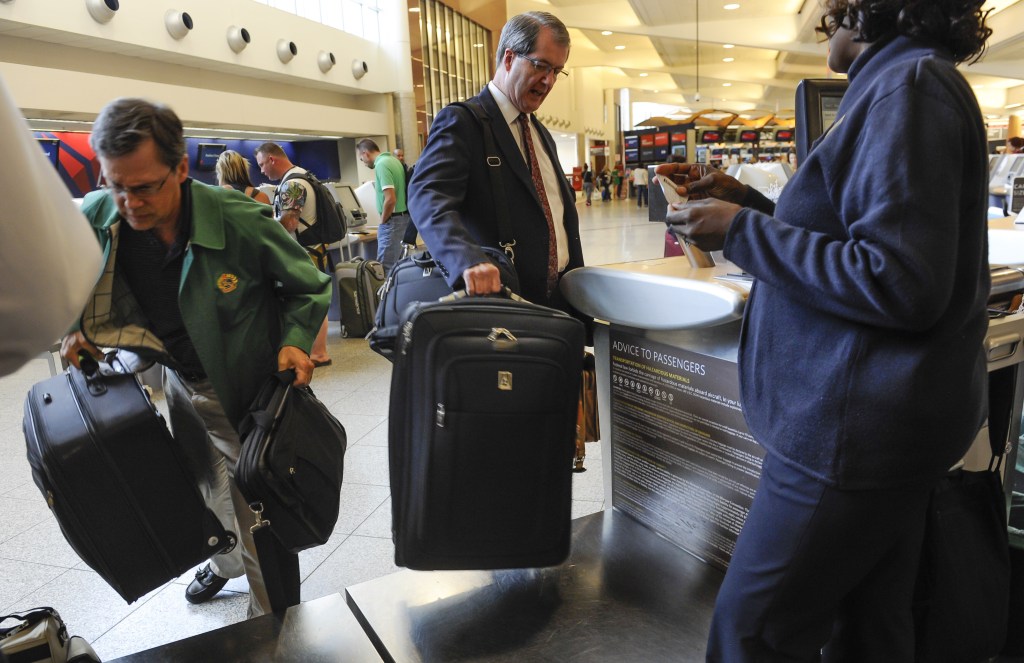NEW YORK – Airlines are introducing a new bevy of fees, but this time passengers might actually like them.
Unlike the first generation of charges that dinged fliers for once-free services like checking a bag, these new fees promise a taste of the good life, or at least a more civil flight.
Extra leg room, early boarding and access to quiet lounges were just the beginning. Airlines are now renting Apple iPads preloaded with movies, selling hot first-class meals in coach and letting passengers pay to have an empty seat next to them. Once on the ground, they can skip baggage claim, having their luggage delivered directly to their home or office.
In the near future, airlines plan to go one step further, using massive amounts of personal data to customize new offers for each flier.
“We’ve moved from takeaways to enhancements,” says John F. Thomas of L.E.K. Consulting. “It’s all about personalizing the travel experience.”
Carriers have struggled to raise airfares enough to cover costs. Fees bring in more than $15 billion a year and are the reason the airlines are profitable. But the amount of money coming in from older charges such as baggage and reservation change fees has tapered off. Revenue from bag fees in April, May and June fell 7 percent compared with the same period last year, according to figures released by the government Monday.
So now the airlines are selling new extras and copying marketing methods honed by retailers.
Technological upgrades allow airlines to sell products directly to passengers at booking, in follow-up emails as trips approach, at check-in and on mobile phones minutes before boarding. Delta Air Lines recently gave its flight attendants wireless devices, allowing them to sell passengers last-second upgrades to seats with more legroom.
And just like Amazon.com offers suggested readings based on each buyer’s past purchases, airlines soon will be able to use past behavior to target fliers.
“We have massive amounts of data,” says Delta CEO Richard Anderson. “We know who you are. We know what your history has been on the airline. We can customize our offerings.”
Other airlines are experimenting with tracking passengers throughout the airport. In the future, if somebody clears security hours before their flight, they might be offered a discounted day pass to the airline’s lounge on their phone.
Airlines have yet to find the right balance between being helpful and being creepy. So, for now, most of the data is being used to win back passengers after their flight is delayed or luggage is lost.
“We want to get back to a point where people feel like travel isn’t something to endure, but something they can enjoy,” says Bob Kupbens, a former Target executive and Delta’s current vice president of marketing and digital commerce.
Most fares today don’t cover the cost of flying. While the average domestic roundtrip base fare has climbed 3 percent over the past decade to $361.95, when adjusted for inflation, the price of jet fuel has nearly tripled.
When oil prices spiked in 2008, airlines added checked baggage fees. Passengers still bought tickets on the base price and didn’t think about the extra expense until the day of travel.
Now airlines are recasting fees as trip enhancements.
Travelers like Nadine Angress, of Mansfield, Mass., see the value. Her recent late-night US Airways flight home landed past her 6-year-old son’s bedtime. She had to work early the next morning. So for $30 she bypassed the baggage carousel and had the suitcase delivered.
“That was a very reasonable price to pay,” Angress said. “It’s making your life easier.”
Send questions/comments to the editors.



Success. Please wait for the page to reload. If the page does not reload within 5 seconds, please refresh the page.
Enter your email and password to access comments.
Hi, to comment on stories you must . This profile is in addition to your subscription and website login.
Already have a commenting profile? .
Invalid username/password.
Please check your email to confirm and complete your registration.
Only subscribers are eligible to post comments. Please subscribe or login first for digital access. Here’s why.
Use the form below to reset your password. When you've submitted your account email, we will send an email with a reset code.